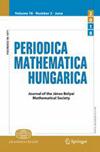关于三个正有理数的和与积的整数值
IF 0.5
3区 数学
Q3 MATHEMATICS
引用次数: 0
摘要
1997年,我们证明了如果n的形式为$$\begin{aligned} 4k, \quad 8k-1\quad {\textrm{or}} \quad 2^{2m+1}(2k-1)+3, \end{aligned}$$,其中$$k,m\in {\mathbb {N}} $$,则不存在正有理数x, y, z满足$$\begin{aligned} xyz = 1, \quad x+y+z = n. \end{aligned}$$。最近,n . x . Tho证明了以下命题:设$$a\in \mathbb N$$为奇数,且取$$n\equiv 0\pmod 4$$或$$n\equiv 7\pmod 8$$。那么方程组$$\begin{aligned} xyz = a, \quad x+y+z = an. \end{aligned}$$在正有理数x, y, z中没有解。我们的结果的一个代表性的例子是下面的陈述:假设$$a,n\in {\mathbb {N}}$$是这样的,至少满足下列条件之一:那么方程组$$\begin{aligned} xyz = a, \quad x+y+z = an. \end{aligned}$$在正有理数x, y, z中没有解。本文章由计算机程序翻译,如有差异,请以英文原文为准。
On integer values of sum and product of three positive rational numbers
In 1997 we proved that if n is of the form $$\begin{aligned} 4k, \quad 8k-1\quad {\textrm{or}} \quad 2^{2m+1}(2k-1)+3, \end{aligned}$$ where $$k,m\in {\mathbb {N}} $$ , then there are no positive rational numbers x, y, z satisfying $$\begin{aligned} xyz = 1, \quad x+y+z = n. \end{aligned}$$ Recently, N. X. Tho proved the following statement: let $$a\in \mathbb N$$ be odd and let either $$n\equiv 0\pmod 4$$ or $$n\equiv 7\pmod 8$$ . Then the system of equations $$\begin{aligned} xyz = a, \quad x+y+z = an. \end{aligned}$$ has no solutions in positive rational numbers x, y, z. A representative example of our result is the following statement: assume that $$a,n\in {\mathbb {N}}$$ are such that at least one of the following conditions holds: Then the system of equations $$\begin{aligned} xyz = a, \quad x+y+z = an. \end{aligned}$$ has no solutions in positive rational numbers x, y, z.
求助全文
通过发布文献求助,成功后即可免费获取论文全文。
去求助
来源期刊
CiteScore
1.40
自引率
0.00%
发文量
67
审稿时长
>12 weeks
期刊介绍:
Periodica Mathematica Hungarica is devoted to publishing research articles in all areas of pure and applied mathematics as well as theoretical computer science. To be published in the Periodica, a paper must be correct, new, and significant. Very strong submissions (upon the consent of the author) will be redirected to Acta Mathematica Hungarica.
Periodica Mathematica Hungarica is the journal of the Hungarian Mathematical Society (János Bolyai Mathematical Society). The main profile of the journal is in pure mathematics, being open to applied mathematical papers with significant mathematical content.

 求助内容:
求助内容: 应助结果提醒方式:
应助结果提醒方式:


